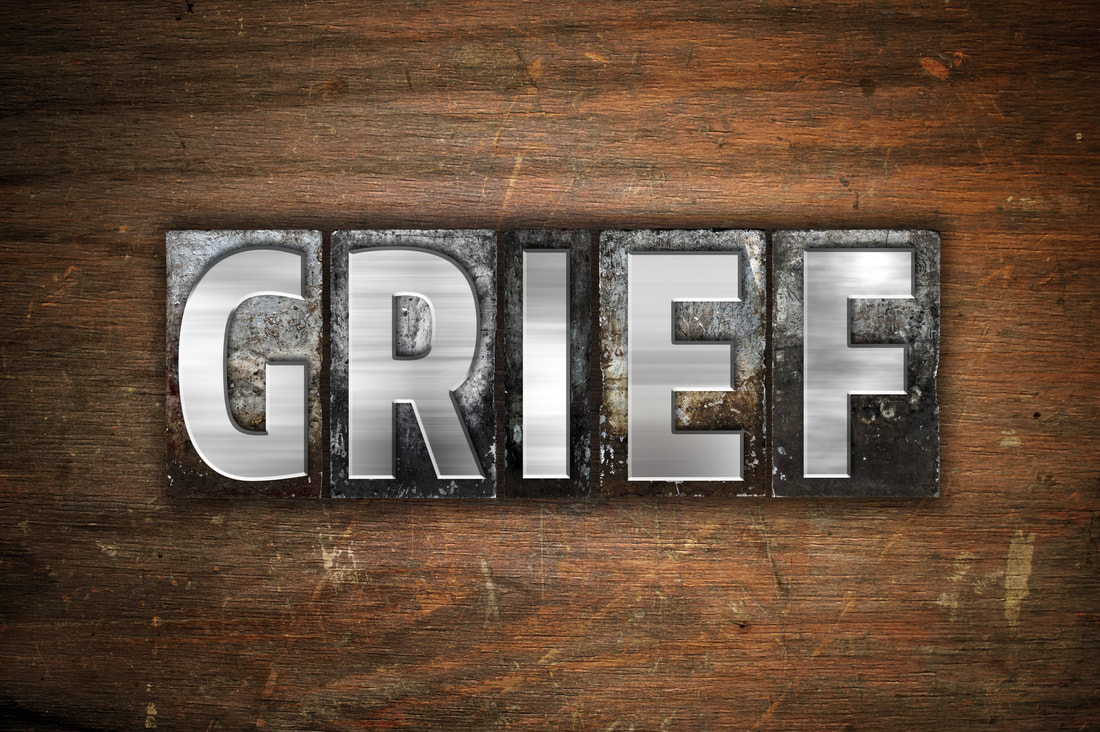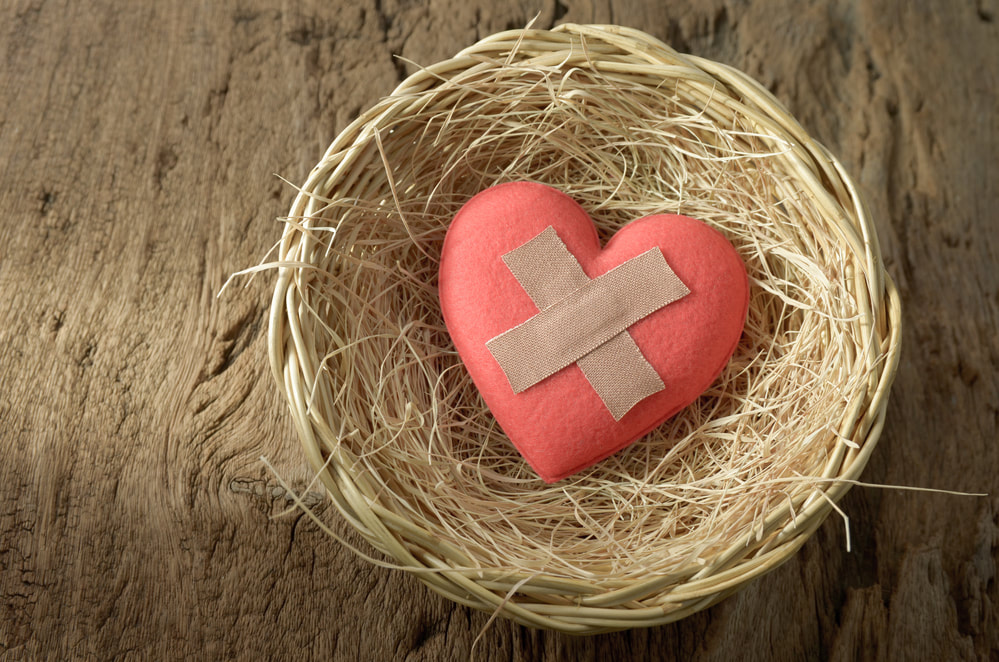|
Counselors and therapists once conceptualized grief as a linear process. It was meant to unfold in predictable stages: denial, followed by anger, bargaining, depression and, finally, acceptance. We used to think grief had a beginning, a middle, and an end. Grief experts think differently now. The grief model has considerably expanded over the last decade. While the above described experiences depict what many grievers encounter after a loss, we now know that the "areas" of grief are neither linear nor universal. What's more, grief has proven itself to be cyclical, free-flowing, and without an endpoint. Though our understanding of the grieving process has evolved, many of the grievers I see in therapy judge themselves harshly when their grief does not look or feel the way they think it should. They should feel more of this or less of that. They admonish themselves for moving forward too quickly; flagellate themselves for lagging behind. This happens even when I remind them that grief is both unpredictable and specific to the griever. Grievers will cling to the idea that, somehow, they are doing grief wrong--even though doing so makes them feel worse than they already do. It's normal, when faced with uncertainty, to yearn for order and predictability--both are associated with our sense of emotional safety. Yet telling ourselves we should feel something other than what we do feel is akin to tossing a boulder into the middle of a stream. It interrupts what would otherwise naturally flow toward its intended destination. Take Sylvia* for example. Silvia was 35 when she sought grief counseling to deal with the death of her beloved father. Sylvia and her father were so close everyone, including Sylvia, expected she would fall apart after his death. But that did not happen. In fact, Sylvia sought therapy because she was concerned about what she described as "a disturbing lack of emotion." We explored this together. When I asked Sylvia to tell me more about her father, her face lit up. She spoke at length about a robust, generous, sharp-witted family man. He was a present and engaged father to Sylvia and a wonderful grandfather to Sylvia’s two children--until he was diagnosed with early onset Alzheimer’s Disease. The diagnosis was followed by a rapid decline in physical and mental health, which sent the whole family into turmoil. Sylvia’s demeanor shifted as she described what it was like to watch the disease whittle away at her father. Just before his death, Sylvia's once-independent role model could no longer feed or bathe himself. He was unable to recognize a single member of the family he loved so dearly. Sylvia's dad was alive. But he wasn't really living. As I listened to Sylvia's story it occurred to me that the issue at hand was not a lack of emotion. It was the belief that her grief was supposed to occur in order. The sadness she expected would come after her father died actually took place long before his physical death. When death marks the endpoint to prolonged suffering, it is common for family members to feel some degree of relief. Rarely can they admit this without feeling guilty. So they don't talk about it all. This was the case for Sylvia. Therapy gave Sylvia the one thing she needed most: a safe place to speak her truth, even though it did not sound the way she expected it would. With time and therapy, Sylvia was able to make peace with her grief. It is when we are vulnerable that we are most worthy of patience and grace yet, for many, this is the time we are least willing to extend it. If you are telling yourself you should be anywhere other than where you are in this moment, I invite you to remember that grief is a natural and organic process that needs only to be witnessed and felt. It's okay to let go of grief-related expectations--they will only get in your way. Instead, trust your grief and yourself. Both are trustworthy. *All identifying information has been changed to protect patient confidentiality. Dr. Jill Gross is a licensed psychologist, therapist, and counselor. She offers grief therapy, divorce consultation, co-parenting support, and other counseling services in the Phinney Greenwood area of Seattle, WA. Having trouble trusting your grief? Schedule a free consultation to see how grief counseling can help you find the forward path.
2 Comments
Early grief is a basket of contradictions. The pain tells us to “do” something but everything hurts and there is nothing we want to do. We want the pain to stop but letting it go feels like a betrayal: of the deceased, of us, of our grief. We long for supportive company but accepting well-intended offers from people who have no idea what we are going through makes us feel even more alone. In moments like these, our pain seems unsoothable: nothing can be done or said to make it dissipate. It’s okay to long for the life you had with your loved one. And, it is equally important to keep going forward with life as it is now. There’s a good chance you feel as sad as you do because you deeply loved someone and because you were deeply loved in return. The truest form of love is the unselfish wish for another to be happy, even when we cannot be with them in physical form. By continuing to care for yourself, you are not only honoring the person you lost, you are stepping toward your own aliveness. Which, conveniently, happens to be the best forward path after loss. We do this slowly, one moment, one day, one week at a time. Here are a few tips to help reconnect you with your own aliveness:
Speaking of time, now may be a good one to remind you that, everything, even your pain, is designed to be temporary. You will hurt for a while but you won't feel this way forever. With each day that passes, each forward step you take, you are succeeding are rebuilding your life. And that is more than enough. Dr. Jill Gross is a licensed psychologist, therapist, and counselor. She offers grief therapy, divorce consultation, co-parenting support, and other counseling services in the Phinney Greenwood area of Seattle, WA. Having trouble rebuilding after the death of a parent, spouse, child, family member or friend? Schedule a free consultation to see how grief counseling can help you move forward in a healthy way. In an ambiguous world, few things are both certain and final. Death is one of them, yet many of us don't know what to do when someone we love loses someone they love. As a grief therapist and counselor, I have observed over the years how intricately fear and anxiety are stitched into the grieving process--for both the griever and for his or her support system. The most common fear among those asked to bear witness to grief is that of saying or doing the wrong thing. This is understandable. We would never want loved ones to hurt more than they are already hurting, certainly not by something we said or did. We may err on the side of staying away, giving those in mourning the space we tell ourselves they need, which, if we are totally honest, is really a way of protecting ourselves from the discomfort associated with making a mistake. There is only one problem with this approach. Anyone in mourning will tell you that it hurts most when others say or do nothing at all. People in acute grief are ashamed of their vulnerability. They worry their pain is more than others can bear. Silent phones, empty mailboxes, and shadowless doorways confirm this fear. Losing a loved one is like being dropped, without a map, into a foreign country where we don’t speak the language. Even the most mundane tasks seem unfamiliar or insurmountable. What better time for a friendly face to happen by with a warm hand, kind words, and a sandwich? Here are a seven things you can do to show support for someone who is grieving:
Even if your texts, calls, and gestures go unanswered, I promise you they do not go unnoticed. Your presence communicates to your loved one, "I can handle this. I'm here. You matter." The above tips were originally featured in this article. If you would like more suggestions on how to support someone who is grieving, be sure and check it out! If you have any thoughts on how to show support when a loved one dies, please feel free to share them in the comments section below. Dr. Jill Gross is a licensed psychologist, therapist, and counselor. She offers grief therapy, divorce support, and other counseling services in the Phinney Greenwood area of Seattle, WA. If you've recently experienced a loss and want to know more about how grief counseling can help you find the forward path, schedule a free consultation. The loss of a spouse or soul mate can generate so many questions. In the acute fog of grief, each moment is its own unique world--changing all the time. We wonder about the basics of survival. How will we get through each day? Will we ever feel 'normal' again? As time passes, the content of our questions shifts toward a greater curiosity about what the future holds. We ask who will hold us again or how we will know the time is right to accept new love into our hearts. What follows is a letter from one reader who, five years after losing her beloved soul mate, is grappling with some of these questions and the feelings that go with them. I hope this letter can be of use to any of you who may be wrestling with how to move forward after losing a spouse or partner. Feel free to share your sentiments and questions in the comments section below. I look forward to hearing from you! Dear Dr. Jill, My husband of twenty-five, amazing, fun-filled years died suddenly of an aneurism about five years ago. I’m not exaggerating when I say John was everything to me. He was my lover, my best friend, my traveling companion. We had two beautiful children. We were inseparable. When John died, my life came to a screeching halt. I can barely remember the first year or two after my soul mate's death. There were days when I couldn’t get out of bed or see anyone. I had trouble eating, showering—even parenting my then teenaged children. There were times when the pain was so bad I thought it would kill me. And there were moments when I actually wanted it to, just so John and I could be together. With the support of my family, friends, and church, I slowly crawled out of the dark hole I was in. I started eating, showering, attending church services, and reengaging with my friends and family. Life is still hard without John but I’m managing as well as can be expected. About six months ago, a fellow church member (I’ll call him Chuck) started asking me to do things. A dinner here. A movie there. I’ve known Chuck since before John died, so I assumed he was just being friendly. However, a few weeks ago, Chuck told me he was interested in something more than friendship. At first, I panicked and told him I was not ready to date. I made a few awkward jokes and then quickly changed the subject. I figured all would return to normal and that would be that. Since that night, I cannot stop thinking about Chuck. Each time I do, I instantly think about John and then I feel guilty. I try to push the thoughts about Chuck out of my head. I haven’t been able to do it. It’s been five years since his death and, yet, I feel like I'm being disloyal to John. I’m worried that my children and my church community will judge me if I start dating again. And what if things don’t work out with Chuck? What then? I’ve relied so heavily upon my church since John died, I’m afraid that a relationship with Chuck might jeopardize my place in the community I've come to rely on. I’m so confused. If I have all of these questions, does that mean that I’m not ready to date? Or does it mean that Chuck is not the right person to date? I was with John for so long and things were so easy. I am not sure I know what is normal and what is a sign that I’m making a bad choice. Any advice you have is appreciated. Signed, When To Say When Dear When, If my arms were long enough, I would reach out and hug you right now! The depth of your love and commitment to John came through in your words. I can only imagine how difficult it was for you to learn how to move forward without him. What also came through in your letter was the transformative power of grief. Though it wasn’t easy, after the initial “grief fog” lifted, you leaned into your support system and created a new normal for yourself. This takes courage and tenacity. Thus, it’s no surprise that any man would feel drawn to your strength! The questions you are asking suggest the presence of both fear and its most reliable sidekick, self-doubt. These feelings make sense. The last time your heart was open, it was devastated by loss. Of course you would feel unnerved as the door to your heart slowly creaks open again. Fear, self-doubt, and romantic attraction do not have to spell disaster or disloyalty. They can instead signify the awakening of parts of yourself that have been dormant since John’s death. Aliveness, in whatever form it presents itself, is always a good thing! It is not necessary (nor is it possible) to know how things will turn out with Chuck. In fact, the outcome may matter less than you think. What's more important is the conscious choice to turn toward your own vitality. When granted permission to do so, the heart will naturally make space for more love. John will always be a unique and integral chapter of your love story. Neither his death nor your choice to seek joy with a new partner will change or undo that. In closing, I would like answer your questions with two of my own: What if there were no mistakes? What your grief gave you everything you need to handle this situation? Proceeding as if both of these things are true will go a long way toward figuring out the next best step. Good luck! Yours In Health, Dr. Jill Dr. Jill Gross is a licensed psychologist and grief counselor in the Phinney - Greenwood area of North Seattle. If you are struggling with the death of a spouse, help is just a click away. Schedule a free consultation to see how grief therapy can help you rediscover your own aliveness! The death of a parent is one of the most painful losses we will encounter. When the life of that parent is marred by addiction, his or her death can complicate the relationships between surviving family members.
This month's letter addresses a family, first torn apart by addiction, and then gutted when their newly-sober mother succumbed to cancer. If you have any thoughts you'd like to share with our letter writer or with this community, please feel free to leave them in the comments section below. Dear Dr. Jill, I am a 43-year-old woman whose mother died of cancer about six months ago. She was my only living parent. Even though I have a younger sibling (age 40), lately, I feel more like an only child. Growing up, my mother was a single parent. She was also a hard-core alcoholic. Most of my childhood memories are of her, either passed out or acting strangely, and me, feeling terrified of what would happen next, desperate to shield my sister from my mother’s behavior. About five years ago, Mom got sober. Two years into her sobriety, she made amends with me. We were just starting to rebuild our relationship when she was diagnosed with lung cancer. She died roughly two years later. I was devastated. Though losing my mom has been difficult, I’m actually writing because I’m not sure what to do about my sister. My sister moved to the East Coast after high school graduation to get away from mom’s drinking. She never looked back. My sister is still really angry at my mom for the years of drinking and even judges me for being so “quick” to forgive her. Mom tried to work things out with my sister but my sister was never really open to this. Since Mom died, I have tried reaching out to my sister but each conversation seems to regress back into my sister’s anger toward my mom. Anger I no longer feel since Mom and I repaired our relationship. At times, my sister’s rage is more than I can handle. I find myself making excuses just to get off the phone—or avoiding her calls altogether. This is not what I want for our relationship. I love my sister. I want so much for us to be close like when we were younger. If things don’t change, I’m afraid the distance between us will keep growing. Have you encountered similar situations? If so, what advice can you give about how to deal with them? Signed, My Sister’s (Anger) Keeper Dear Keeper, First off, my condolences for your loss. How very sad it is that your mother’s life ended, just as it was beginning anew. The death of a parent, for siblings, tends to be scissors or glue: it either draws them closer together or widens the chasm between them. My Spidey senses tell me you and your sister want the death of your mom to be glue but your sister can't stop herself from charging at you with scissors! You are grieving the most recent version of your mother while your sister is grieving the mother she fled after high school (i.e., a very different mother). Even though you technically lost the same person, your grief looks and feels different right now for this reason. What’s more, I would venture to guess your sister feels conflicted about her choice to decline your mother’s attempt at making amends. This choice was likely made under the auspices that your mother had more time than she did. It is also a choice your sister cannot go back and change now that your mother is gone. If given the option to feel sad and vulnerable or angry and powerful, many of us will choose the latter until we are strong enough to be with the former. It is hard to be caught in anger’s slipstream when you are feeling hurt. Thus, I recommend limiting conversations with your sister to the times you feel fortified enough to hold her pain. When you do speak with her, set limits if she becomes disrespectful. If she is unable to heed those limits, politely end the conversation and try again later when she's more calm. Though you care deeply for your sister, you are not responsible for her choices or the feelings she has about them. And appropriate self-care is nothing to feel guilty about. That said, anger needs only to be acknowledged (sometimes over and over again) for it to recede and, when it does, what usually rushes forward is sadness. I suspect your sister will be easier to connect with once the hard edge of anger is softened by her sadness. In the meantime, because you deserve to be supported in your grief, I recommend connecting with close friends, other family members, a support group for adult children who have lost parents, etc. Grief longs to be witnessed. Ideally your sister would be that witness but, right now, she’s too steeped in her own grief to hold yours. It's unfortunate. And, it's not personal. Finally, remember that grief is fluid. It moves around a lot. Just as you will not always feel this sad, your sister will not always feel this angry. Keep showing up with your boundaries intact and, when she is ready to put down the scissors, the relationship is likely to feel a lot more like glue--for both of you! Your In Health, Dr. Jill Dr. Jill Gross is a licensed psychologist, counselor and dating coach in the Phinney -Greenwood area of North Seattle. If you and your siblings are struggling with the death of a parent, help is just a click away. Schedule a free consultation to see how grief therapy can help restore peace in your family! |
AuthorDr. Jill Gross is a licensed psychologist, specializing in grief and divorce. Her coaching and therapy practice is located in the Phinney - Greenwood area of North Seattle in Washington. Archives
May 2021
Categories
All
|
HoursM-TH: 8:30 AM - 2:00 PM.
By Appointment Only |
Telephone & Email |
Address503 N. 50th Street
Seattle, WA 98103 |
*Header Photographs courtesy of Josh Martin







